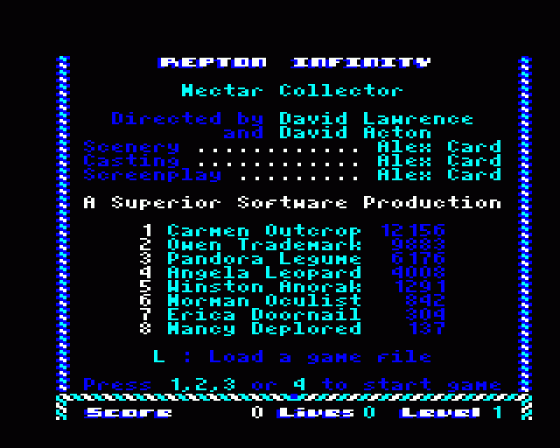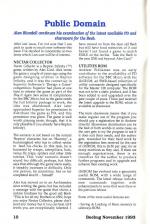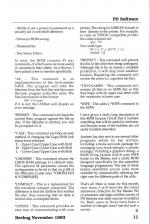
Beebug
 1st November 1993
1st November 1993
Categories: Review: Software
Author: Alan Blundell
Published in Beebug Volume 12 Number 6
Alan Blundell continues his examination of the latest available PD and shareware for the Beeb.
Public Domain
After last issue, I'm not sure that I can pack in quite so much new software this issue: I've decided to concentrate on two items which I am sure will be of interest.
Nectar Collector
Nectar Collector is a Repton Infinity game, written by Alex Card. Alex wrote the game a couple of years ago using the game designing utilities in Repton Infinity, and it was the runner-up in Superior Software's 'Design a Game' competition. Superior had plans at one time to release the game as part of the Play It Again Sam series of compilations for the BBC Micro, but as the game needs the full Infinity package to work, the idea was abandoned. Alex later approached Superior for permission to distribute the game as PD, and this permission was given. The game is well worth playing (note, though, that it is only playable if you already have Repton Infinity).
The scenario is not based on the normal 'Repton' character, but on 'Hummy', a hummingbird who has to collect nectar to feed his chicks. In this task, he is harassed by wasps, caterpillars, bats, venus fly traps, spiders and other little nasties. This 'cute' scenario doesn't sound too difficult, perhaps, but Alex says that although the game starts easily, it steadily increases in difficulty. Only one person, he maintains, has so far completed level 8 ... himself!
Alex has moved on to an Archimedes since writing the game, but has included a message with the game that shows a certain fondness for the good old Beeb: "This is for all my Brothers in 6502, hope you enjoy Nectar Collector, please don't send any money but if you can beat all eight levels you are exceptionally talented. I have moved on from the dear old Beeb but still have fond memories of it and haven't yet found a game to match Exile on the Archie. Take the Beeb to the year 2000 and beyond. Alex Card."
Utilities Rom
Andrew Fiddaman was an early contributor to the availability of PD software for the BBC Micro with his UtilROM, an SWR-based collection of utility commands designed specifically for the Master 128 computer. The ROM was not to be a static product, and it has been added to and upgraded over the past couple of years. I have just received the latest upgrade to the ROM, which is available as shareware.
The term shareware means that if you make regular use of the program you should pay a registration fee to Andrew directly. Shareware distribution can be the best of both worlds in some cases, as the user gets to try the program to see if it does suit their needs, and the author gets rewarded for their hard work by the registration fees received (in the case of UtilROM, this is £6.50 per user, for as many machines as they use). If there are enough registrations, there is an incentive for the author to produce further programs and to upgrade and enhance their existing work.
UtilROM has evolved into a genuinely useful ROM, with a wide range of commands. The latest release includes new commands together with enhancements to some that were there in the previous release.
Some of the most useful features are:
- Saving & Loading of Basic memory to sideways ROM.
- Ability to set a power-on password as a security aid or anti-theft deterrent
- Sideways ROM saving.
- Disassembler.
- Disc Sector Editor.
In total, the ROM contains 49 star commands, of which some are more useful or uncommon than others. As a flavour, I have picked a few to mention specifically:
*AS - This command is an implementation of the Archimedes SAVE. The program will take the filename from the first line and then save the basic program under this name. The first line must be of the format: REM >filename
If it is not, the UtilRom will display an error message.
*BVERIFY - This command will check the current Basic program against the file on disc. If the filename is omitted, you will be prompted for it.
*CASE - This command provides an easy method of changing the Caps/Shift lock status from software:
U - Upper Case/Upper Case with Shift
M - Upper Case/Lower Case with Shift
L - Lower Case/Upper Case with Shift
*CMOSDEF - This command returns the CMOS RAM settings to a default state. The optional M parameter causes the configuration to be set to that on p.244 of the Welcome Guide (also *CMOSLOAD & *COMSSAVE).
*COMPACT - This is a replacement for the standard compact command. The difference is that the UtilRom first verifies the disc, thus ensuring that no data is moved onto a corrupted sector.
*LPRINT - This command provides an easy way of communicating with your printer. The string (in GSREAD format) is sent directly to the printer. For example, to reset an EPSON compatible printer, the codes required are:
<Esc> "@"
You could type:
VDU 2,1,27,1,ASC"@",3 or:
*LPRINT | [@
*PROTECT - This command will prevent the disc in the drive from being catalogued. Although this is by no means a complete protection, it will stop most amateur hackers. Repeating the command will reverse the action (i.e. unprotect the disc).
*TIDYNAMES - This command will rename all files on an ADFS disc so that they begin with an upper case letter with the remainder in lower case.
*WIPE - This adds a *WIPE command to the ADFS.
I have given a fairly long description of this ROM because I think that it contains something that will be useful to everyone, and because some of the facilities are not easily locatable elsewhere.
Andrew has also sent to me several other programs which he has written, including a home accounts package for managing your bank balance, a printer manager including a graphics dump, a RAM filing system which uses SWR banks on the Master, and a utility ROM designed specifically for the assembly language programmer. The last of these makes assembler source code more readable by automatically selecting the right case for different parts of the code.
That's all there is room for this month; next issue, I will describe the latest shareware collection for the Master 512 co-processor and begin another survey of PD libraries and other sources of material for Beeb users as there have been a number of changes since I last did such a survey.
This article was converted to a web page from the following pages of Beebug Volume 12 Number 6.






